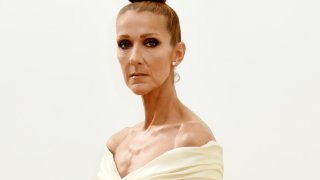
Celine Dion has revealed she has a rare medical condition that has forced her to postpone dates on her European tour next year.
In an emotional Instagram video in which she repeatedly fought back tears, the Grammy-winning singer announced that she has stiff-person syndrome, a rare neurological disease she said causes painful spasms and makes it difficult for her to walk.
“Hello, everyone. I’m sorry it’s taken me so long to reach out to you. I miss you all so much and I can’t wait to be on stage talking to you in person,” Dion, dressed in a black outfit, said in the video, which was posted on Dec. 8.
“As you know, I’ve always been an open book and I wasn’t ready to say anything before, but I’m ready now. I’ve been dealing with problems with my health for a long time and it’s been really difficult for me to face these challenges and to talk about everything that I’ve been going through.
“Recently, I’ve been diagnosed with a very rare neurological disorder called the stiff-person syndrome, which affects something like one in a million people. While we’re still learning about this rare condition, we now know this is what’s been causing all of the spasms that I’ve been having. Unfortunately, these spasms affect every aspect of my daily life, sometimes causing difficulties when I walk and not allowing me to use my vocal chords to sing the way I’m used to.”
Entertainment News
The “My Heart Will Go On” singer said she has to cancel dates on her European tour while she works to get better.
“It hurts me to tell you today that this means I won’t be ready to restart my tour in Europe in February,” she said, while choking up. “I have a great team of doctors working alongside me to help me get better and my precious children, who are supporting me and giving me hope.”
Feeling out of the loop? We'll catch you up on the Chicago news you need to know. Sign up for the weekly Chicago Catch-Up newsletter.
Dion said getting better has been a challenge.
“I’m working hard with my sports medicine therapist every day to build back my strength and my ability to perform again, but I have to admit it’s been a struggle,” she said. “All I know is singing. It’s what I’ve done all my life and it’s what I love to do the most.
“I miss you so much. I miss seeing all of you, being on the stage performing for you. I always give a hundred percent when I do my shows, but my condition is not allowing me to give you that right now," she said.

Dion ended her message with a note of optimism, expressing appreciation for her fans.
“I want to thank you so much for your encouraging wishes and love and support on my social media. This means a lot to me,” she said. “Take care of yourselves. Be well. I love you guys so much and I really hope I can see you again real soon.”
Dion had canceled North American tour dates in January and European dates in April due to health issues.
“I’m getting treatment from my doctors, taking medication, but I’m still experiencing some spasms and it’s taking a lot longer for me to recover than I had hoped,” she said in an Instagram video in April.
Stiff-person syndrome, or SPS, is a rare neurological disorder with some features of an autoimmune disease, according to the National Institutes of Health.
“SPS is characterized by fluctuating muscle rigidity in the trunk and limbs and a heightened sensitivity to stimuli such as noise, touch, and emotional distress, which can set off muscle spasms," NIH said on its website. "Abnormal postures, often hunched over and stiffened, are characteristic of the disorder."
People with the disease can be so disabled they are unable to walk or move, NIH said. Loud noises can also trigger spasms or falls, the institute said.
NIH also said twice as many women as men are afflicted with SPS. It’s unclear what causes it, although NIH notes it “is often misdiagnosed as Parkinson’s disease, multiple sclerosis, fibromyalgia, psychosomatic illness, or anxiety and phobia.”
Dion did share rescheduled dates for her European tour on her Instagram stories. Those will kick off March 6, 2024, in Prague and wrap up April 21-22, 2024, in London.
This story first appeared on TODAY.COM. More from TODAY:



